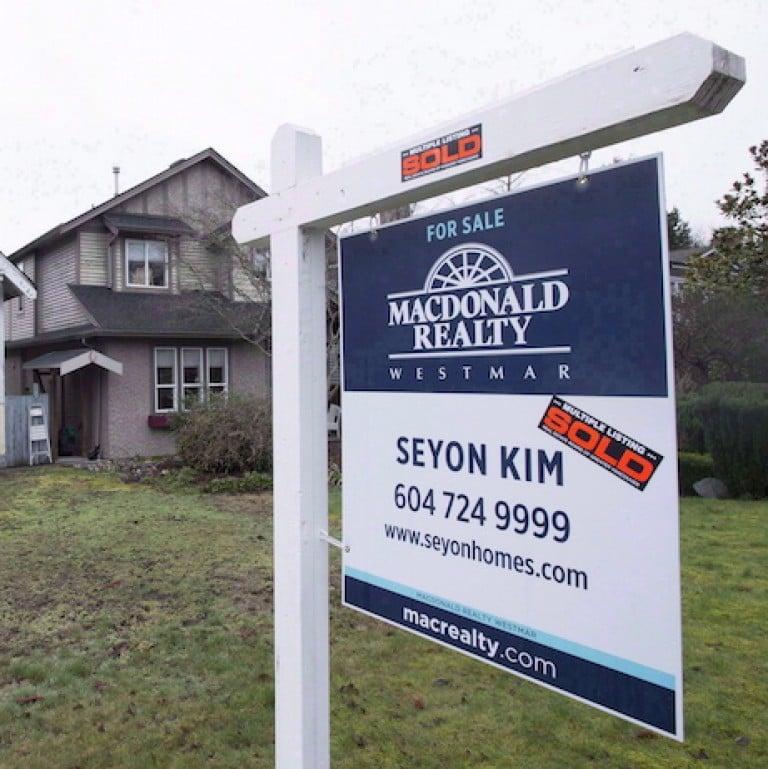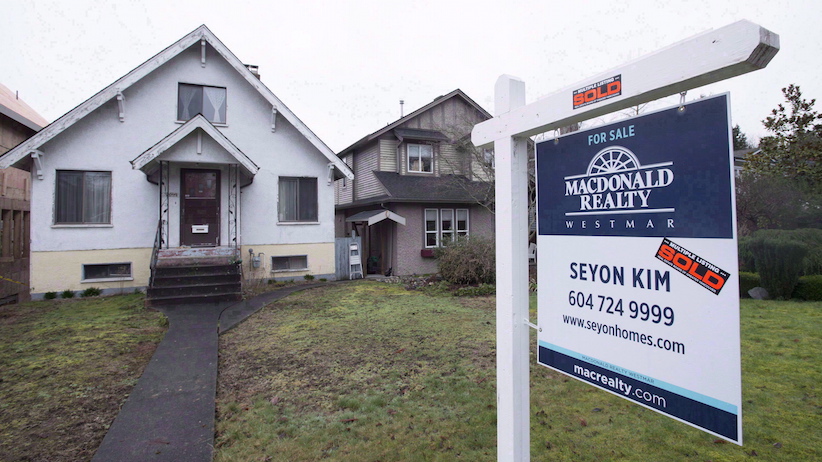Canada’s economy is hostage to the housing bubble
The debate over B.C.’s new tax on foreign buyers exposes how badly the Canadian economy needs ridiculously unsustainable house prices to keep rising

A sold home is pictured in Vancouver, B.C., Thursday, Feb. 11, 2016. Canada Mortgage and Housing Corporation says there is mounting evidence that house prices in a number of Canadian cities are out of whack with incomes and other economic fundamentals.The latest report from CMHC says there is evidence of overvaluation in nine of the 15 real estate markets included in the research. THE CANADIAN PRESS/Jonathan Hayward
Share

When one of the real estate industry’s largest lobby groups, Mortgage Professionals Canada, released a report last month analyzing the state of the country’s housing market, it found, to absolutely no one’s surprise, zero evidence of a bubble that would warrant political intervention. “Now that the energy sector is no longer a major economic driver, a healthy housing sector is even more essential,” the organization’s chief economist, Will Dunning, warned in a statement. “It would be tragic to unnecessarily impair this key economic force.”
If that sounds like a ransom note, it more or less was: do anything to jeopardize the housing boom, bub, and the economy gets it. Obvious self-interest aside, Dunning and others who have issued similar warnings are right, to a point. Canada’s economy is hostage to the housing market. Rising house prices and the accompanying wealth effect, courtesy of ballooning equity lines of credit, have kept the economy from faltering as business spending retrenches and exports disappoint—last year real estate was by far the largest contributor to GDP in seven of 10 provinces, including B.C. and Ontario.
Meanwhile the chart below shows Canada’s economy has never been more reliant on residential real estate and household spending. (It’s actually an update of a chart former Bank of Canada Governor Mark Carney used in 2012 to highlight the extent to which the economy had come to depend on households. As the forecast at the time showed, the Bank firmly believed this would slowly improve over the ensuing years. Instead, it exploded higher.)
Deep down every homeowner, speculator, realtor, Bay Street financier, mortgage broker, bricklayer, central banker, car dealer, politician, regulator and kitchen countertop installer in the country is worried by the prospect this game might end. As B.C. Finance Minister Mike de Jong said earlier this year, “You’ve got to be careful about having the state intervene to try and regulate pricing, or depress pricing. That will have consequences for a lot of families.”
Yet the din of calls for politicians and policy-makers to tackle affordability problems in red-hot markets like Vancouver and Toronto has grown deafening. Which brings us to the flurry of announcements coming out of B.C. First the province moved to end the self-regulation of the real estate industry after multiple reports of shenanigans. It then started tracking and releasing data about the scale of foreign buying in Metro Vancouver (about 10 per cent of the value of all deals, equal to $885 million over a five-week period). Now the provincial Liberals have introduced a 15 per cent tax on foreigners who buy property in Metro Vancouver. That’s a $300,000 tax bill on a $2 million home. It takes effect Aug. 2, and already Ontario is considering a similar tax, saying it’s concerned foreigners rebuffed by B.C. will shift their focus to Toronto.
Even though the real estate industry in B.C. has long argued foreign buyers are a small part of the market, it has come out strongly against the tax, arguing it “needlessly injects uncertainty into the market.” But will these new measures really bring affordability back to the Vancouver market? And by that we mean bring an end to double-digit price gains, bring about a steep correction in house prices to levels the city’s lowly middle-class incomes can afford, bring about an end to staggering household debt levels and ultimately, bring about the end of housing as the economy’s engine of growth?
I’m not convinced. The new tax is, relatively speaking, a politically safe and mild measure. It lets the government be seen to be doing something about high real estate prices at a time when polls overwhelmingly show voters want action on the issue. Conveniently, it also lets the province fill its coffers without the customary backlash that usually accompanies a tax grab. After all, if there’s one tax people can get behind, it’s a tax that targets filthy rich foreigners (the Liberals said the funds will go to new spending on “housing and rental programs”).
But the tax itself may also prove ineffective. Will a 15 per cent tax matter to an offshore speculator who is convinced the value of the house he or she buys will grow by double that rate in one year? If $2 million for a rundown bungalow seems reasonable, might not $2.3 million? Also, if indeed foreign buyers (read: mainland Chinese) are shunting their money out of China and away from the reach of an increasingly authoritarian government, might the tax simply be seen as an unfortunate but necessary fee given the alternative?
This all assumes that the tax works as planned. B.C. has commenced a cat-and-mouse game with people with extremely deep pockets and access to very smart accountants and lawyers, a valid point the provincial NDP raised. Nor will the tax apply to buyers who come to B.C. by way of Quebec, which maintains an investor immigrant program that sees wealthy newcomers “invest” $800,000 in exchange for visas. De Jong, who earlier dismissed the suggestion that foreign buyers were driving house prices, has also dismissed this line of thinking as “conspiratorial,” though the numbers suggest it’s worth consideration: last year just under 5,000 foreigners and their family members entered Quebec through the program, and historically close to 90 per cent have made their way to B.C.
Ultimately B.C.’s new tax will likely fail to cool the overheated market for the same reason every other effort to date—tighter mortgage lending standards, larger down-payment requirements, jawboning bordering on pleading from the Bank of Canada—has failed. The world is awash in cheap debt, and whether we’re talking about wealthy foreigners or local residents desperate not to be shut out of the market, the siren call of fast-rising house prices is too powerful to ignore. Until that changes, Canada’s economy will continue to be captive to the bubble.